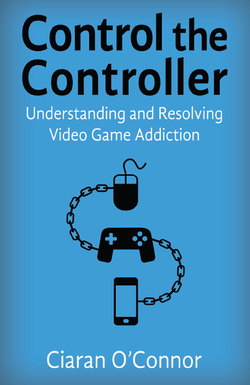Читать книгу Control The Controller - Ciaran O'Connor - Страница 7
На сайте Литреса книга снята с продажи.
ОглавлениеCHAPTER ONE
The Damage of Video Game Addiction
Nearly every day there are new articles published about video game addiction. These range from the mildly concerned to the outright scare-mongering. It is very difficult to know exactly what is at risk when a gamer plays too much, or more importantly, plays to the point of becoming addicted. This chapter seeks to bring together some of the evidence and give a realistic overview of the short and long-term risks of someone being addicted to video games.
Gaming addiction, at its most severe, can have a harmful effect on a person’s wellbeing. While there are a range of ways in which this can happen, the damage is most acute in how it affects a person’s relationship with others. It can limit confidence in social interactions as well as creating tension, alienation and conflict within a household.
There is relatively little physical risk associated with gaming too much; typically what harm is done to the body is minimal and only affects a small percentage of addicted gamers. Symptoms that do occur include: insomnia, poor attention span, motion sickness, headaches, dry eyes, muscle pains, various repetitive strain injuries, and auditory hallucinations. All of the above conditions will typically pass once the gamer ceases to game so frequently (King 2013b). There are instances where gaming has been linked to epilepsy. This is something that the gaming industry has had to address in the way it uses light and animation; both “Pokémon” and “Super Mario” having to be redesigned following some adverse responses from users. Overall, while the chance of a seizure does increase for gamers, the likelihood of it happening is considerably less than a percent of a percent (CSPH 2007). If anything it is a useful incentive to make sure gaming doesn’t go on in isolation – something I’ll talk more about later.
When it comes to the physical dangers of gaming, the most pressing issue is the general lack of health that we end up with once we spend long periods of time sitting still. A shortage of exercise, a typically poor sitting position and no time in the fresh air and sun is well documented as having general negative impact on physical and mental health. But our bodies are not where we should prioritise our concerns; it is too often relationships that are the real casualty of video game addiction.
The Social Risk of Gaming
An addiction to gaming will almost certainly create a number of significant social problems; ultimately becoming a catch-22, like any other addiction. Whatever the problems were that drove a person to overuse gaming, those problems will start to magnify once the behaviour becomes addictive. This can lead the gamer to turn to gaming even more in order to feel better, and so the problems spiral until the gamer finally and decisively changes course.
Unless steps are taken to reduce gaming addiction, sufferers will ultimately see their relationships wither away, possibly even becoming irreparably lost. There will be those that will simply stop wasting their time trying to get in touch or arranging to meet. Loved ones will, if the gamer is lucky, start to fight back against the games, insisting upon time being put back into themselves and others. If the gamer is not so lucky then they will gradually see even these relationships fall away. This will happen slowly and subtly; it is often the case that addicted gamers fail to see the extent to which they have drifted away until they are forced to reflect on how things used to be. This damage is particularly acute for people who become addicted in their teenage years. While such people are likely to overcome the gaming addiction, they will find themselves playing social catch-up with their peers, something they may never feel like they can achieve in the long run.
The most addictive games are online roleplaying games, such as the incredibly successful “World of Warcraft”, whereby players will be constantly engaging with one another online (Nagygyorgy 2013). While there is nothing unreal about the connection and bond that gamers feel with one another online, it crucially lacks the face-to-face experience that we encounter in the world away from games. Many young men I have worked with are drawn to these relationships because they find them to be more dependable and trustworthy relationships, something we will talk more about later. For now it is important to note that even though gamers may have a thriving social life online, they are often lacking an important aspect of human connection in not being with people in person – one that will gradually erode their confidence should they not redress the online/offline balance.
Online social interactions within games are frequently negative. For all the benefits of having an anonymous internet, the disadvantage is that for many people, this lack of accountability gives them permission to be negative and even insulting toward one another. For those that are new to games they will often have to stand up to ridicule at their lack of familiarity with the game, and at higher levels the competitiveness and intensity of the challenge can frequently lead to bullying, trash-talking and flaming. Many of the young people I have worked with have developed a negative worldview which, in part, I see as a direct result of their being over exposed to this cynical and hostile environment.
Definition: Trash-talking and Flaming
